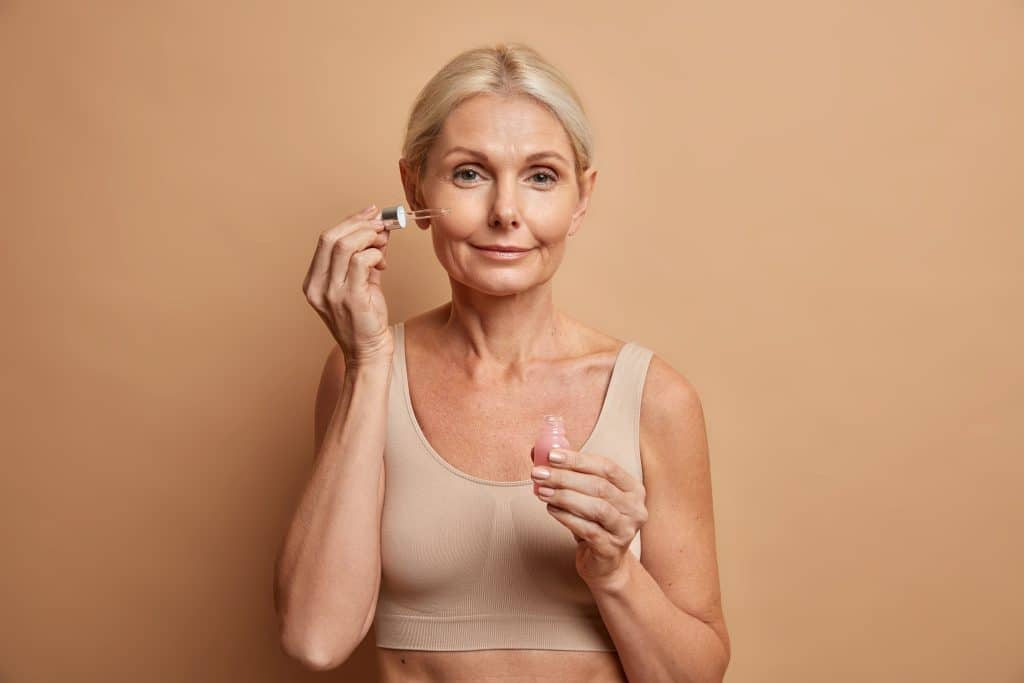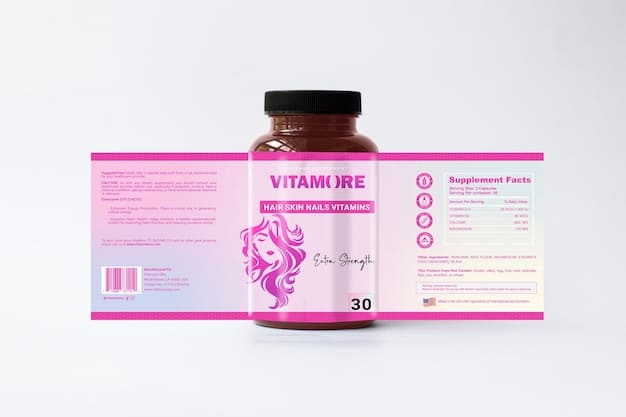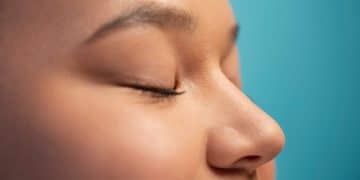Clinically Proven Type II Collagen: 15% Wrinkle Reduction in 3 Months?

A significant reduction in wrinkles by 15% within three months with type II collagen supplements often refers to studies on specific collagen peptides, particularly hydrolyzed collagen, which stimulate the body’s own collagen production, rather than exclusively type II, predominantly found in cartilage.
In the relentless pursuit of youthful skin, the promise of a “collagen comeback” resonates deeply. We’re bombarded with options, but the question intensifies: Which Type II Collagen Supplements Are Clinically Proven to Reduce Wrinkles by 15% in 3 Months? This ambitious claim necessitates a deep dive into scientific evidence, differentiating marketing hype from verifiable results. Let’s explore the science, the types of collagen, and what genuine clinical proof truly entails for anti-aging endeavors.
Understanding Collagen and Its Role in Skin Health
Collagen, often hailed as the body’s structural scaffolding, is the most abundant protein in humans, making up about one-third of its total protein content. It’s the primary component of connective tissues like skin, tendons, ligaments, and cartilage. In the skin, collagen provides strength, elasticity, and hydration, which are all crucial for maintaining a youthful and smooth appearance. As we age, our body’s natural collagen production significantly declines, leading to visible signs of aging such as wrinkles, fine lines, and sagging skin.
Numerous types of collagen exist, each with a specific structure and function within the body. While there are at least 28 identified types, a few are more pertinent to skin health and supplementation discussions. Understanding these distinctions is fundamental before we explore the claims surrounding specific supplements. This foundational knowledge helps to clarify why certain types are marketed for particular benefits and how they interact with our biological systems.
The Different Types of Collagen and Their Functions
The vast family of collagen proteins can be intimidating, but focusing on the most common types helps simplify their roles. Each type plays a unique part in maintaining our body’s integrity and function, from joint support to skin elasticity.
- Type I Collagen: The most prevalent type, found in skin, bone, teeth, tendon, ligaments, and vascular ligature. It’s primarily responsible for skin elasticity and strength, making it crucial for anti-aging.
- Type II Collagen: Predominantly found in cartilage, this type is essential for joint health and flexibility. Its role in skin wrinkle reduction, as we will see, is often a point of nuanced scientific discussion.
- Type III Collagen: Frequently found alongside type I in skin, muscles, and blood vessels, it contributes to skin’s suppleness and structure. It’s often associated with promoting a youthful appearance.
- Type IV Collagen: Forms the basement membrane, a thin sheet that supports epithelial cells. It’s important for filtration and structural support in various organs, including the skin.
Each type offers distinct benefits, and the choice of supplement often depends on the desired health outcome. When it comes to skin, types I and III are usually highlighted as the primary contributors to dermal structure and elasticity. This context becomes vital when evaluating claims about Type II collagen’s efficacy for wrinkles.
The interplay between these collagen types ensures the integrity and resilience of our tissues. For instance, while Type II is critical for cushioning our joints, its direct impact on skin aesthetics requires careful consideration, often involving a shift in how its benefits are perceived and communicated, particularly when considering specific skin concerns like wrinkles. The science of how ingested collagen is processed and distributed throughout the body is complex and an area of ongoing research.
Deconstructing the Claim: 15% Wrinkle Reduction in 3 Months
The assertion that a collagen supplement can reduce wrinkles by a specific percentage within a defined timeframe is powerful and naturally piques interest. However, such claims demand rigorous scrutiny. When we encounter “clinically proven to reduce wrinkles by 15% in 3 months,” several questions immediately arise: What kind of collagen? What studies support this? And what does “clinically proven” truly mean in this context? Distinguishing robust scientific evidence from anecdotal reports or marketing buzz is crucial for consumers seeking genuine anti-aging solutions.
Many clinical studies on collagen and skin health focus on hydrolyzed collagen or collagen peptides, which are broken down into smaller, more easily absorbed particles. These peptides, regardless of their original type (I, II, or III), are believed to stimulate the body’s natural collagen production. This stimulation, rather than the direct integration of ingested collagen into the skin, is the proposed mechanism for improved skin hydration, elasticity, and, subsequently, reduced wrinkle depth. Understanding this mechanism is key to interpreting clinical study results.

The Role of Hydrolyzed Collagen vs. Undenatured Type II Collagen
The term “Type II collagen” can sometimes be used broadly, but it’s essential to understand the distinction between native (undenatured) and hydrolyzed (processed) forms, especially concerning skin benefits. Undenatured Type II collagen is primarily known for its role in joint health, often working through immune mechanisms to reduce inflammation and support cartilage. Its direct impact on skin wrinkles is not the primary focus of most research.
Conversely, hydrolyzed collagen, or collagen peptides, are produced by breaking down collagen from various sources (bovine, marine, porcine) into smaller fragments. These fragments contain amino acids that serve as building blocks for new collagen and elastin, or they act as signaling molecules to trigger the body’s fibroblasts to produce more collagen. Many of the studies demonstrating wrinkle reduction use hydrolyzed collagen, which can be derived from types I, II, or III, but once hydrolyzed, the “type” becomes less significant than the peptide composition and bioavailability.
- Hydrolyzed Collagen: Often derived from Types I and III, broken down into peptides, highly bioavailable, designed to stimulate fibroblast activity in the skin.
- Undenatured Type II Collagen: Retains its triple helix structure, typically sourced from chicken sternum, primarily targets joint health through immune modulation.
- Mechanism in Skin: Most skin benefits, including wrinkle reduction, are attributed to hydrolyzed collagen’s ability to boost endogenous collagen synthesis, not direct replenishment by undenatured Type II.
Therefore, when a product claims wrinkle reduction, it is immensely important to investigate whether they are referring to studies conducted on generic hydrolyzed collagen peptides (which might originate from Type II but are processed) or specific undenatured Type II collagen. The scientific literature overwhelmingly supports hydrolyzed collagen peptides for skin improvements, whereas undenatured Type II collagen’s primary evidence base lies in joint health.
The marketing can sometimes conflate these two, leading to consumer confusion. A “Type II collagen” supplement specifically marketed for wrinkles should ideally refer to a hydrolyzed form, or provide compelling evidence for its undenatured form’s efficacy in skin, which is less common. Without this clarification, the consumer might not be getting the specific benefit they expect.
Clinical Evidence: What the Studies Really Say
To ascertain which Type II collagen supplements, if any, are clinically proven to reduce wrinkles by 15% in three months, we must delve into the scientific literature. Rigorous clinical trials, often double-blind, placebo-controlled studies, are the gold standard for validating such claims. These studies measure various parameters of skin health, including wrinkle depth, skin elasticity, hydration, and dermal collagen density, using objective instruments.
Many studies supporting collagen supplementation for skin health specifically examine hydrolyzed collagen peptides, which are often a mix of types I and III, or are simply categorized as “collagen peptides” without specifying a particular type. These studies have indeed shown promising results, with some reporting improvements in skin firmness, elasticity, and a reduction in wrinkle depth. However, tying a “15% reduction in 3 months” specifically to Type II collagen requires precise evidence tailored to that type, in a form known to impact skin.
Key Studies and Their Findings on Collagen for Wrinkle Reduction
Several landmark studies have contributed significantly to our understanding of collagen’s potential in anti-aging. A meta-analysis published in the Journal of Drugs in Dermatology, for instance, reviewed 11 studies involving 805 patients. It concluded that oral collagen supplementation significantly increased skin elasticity, hydration, and dermal collagen density. While these studies did not always specify “Type II” collagen, they predominantly used hydrolyzed collagen formulations.
One notable study, published in Skin Pharmacology and Physiology, investigated the effects of a specific hydrolyzed collagen peptide on skin aging. Participants showed a significant reduction in eye wrinkle volume by an average of 20% after just 8 weeks of daily intake. Another study in the same journal found a 7.2% reduction in wrinkle depth after 4 weeks and a further improvement at 8 weeks. These findings suggest that certain hydrolyzed collagen formulations can indeed yield measurable results in relatively short periods.
However, it is crucial to note that these studies typically used multi-type hydrolyzed collagen or specifically processed collagen peptides, not primarily undenatured Type II collagen. The focus of undenatured Type II collagen research is predominantly on joint and cartilage health, where it has shown efficacy in reducing pain and improving mobility. Therefore, consumers looking for wrinkle reduction should seek out supplements that contain research-backed hydrolyzed collagen peptides, regardless of their original type, rather than necessarily focusing on Type II as the primary skin-renewing agent.
- Study Focus: Most positive studies for wrinkle reduction utilize hydrolyzed collagen peptides (often type I & III blend).
- Reported Reductions: Some studies show reductions in wrinkle volume/depth ranging from 7% to 20% over 8-12 weeks.
- Mechanism: Benefits stem from stimulating the body’s own collagen and elastin production.
- Specific Type II Impact: Direct clinical evidence for undenatured Type II collagen specifically reducing skin wrinkles by 15% in 3 months is less robust compared to hydrolyzed peptides.
The “15% in 3 months” claim, while plausible for certain hydrolyzed collagen products, is less directly attributable to undenatured Type II collagen. The critical takeaway is to scrutinize the specific formulation of the supplement and the research behind it, ensuring alignment with your desired outcome for skin health rather than relying solely on a collagen “type” that may not be primarily designed for skin benefits.
Distinguishing High-Quality Supplements from Marketing Gimmicks
In a market flooded with anti-aging supplements, discerning between genuinely effective products and those relying on clever marketing is a significant challenge. The “Collagen Comeback” often brings with it a wave of new products, each vying for consumer attention. When looking for a supplement that promises tangible results like a 15% wrinkle reduction, a critical eye is essential. High-quality supplements are characterized by transparency, scientific backing, and reputable manufacturing practices, ensuring both efficacy and safety.
A legitimate supplement brand will readily provide access to the clinical studies supporting its claims. This means more than just a passing mention; it involves detailed information about the study design, participant numbers, methodologies, and the specific active ingredients tested. Consumers should be wary of vague assertions or claims that link to studies on generic collagen without specifying the exact formulation or dose used in the product. The source of collagen, its processing method, and additional ingredients also play a crucial role in overall quality and potential benefits.

What to Look for in a Clinically Proven Collagen Supplement
When you’re trying to find a collagen supplement that lives up to its promises, especially regarding wrinkle reduction, there are specific elements to scrutinize that go beyond pretty packaging. These indicators help differentiate a science-backed product from a mere trend.
- Hydrolyzed Collagen Peptides: Prioritize supplements containing hydrolyzed collagen peptides. These are more bioavailable and are the formulation most consistently studied for skin benefits. Look for evidence that the specific peptide blend used has been clinically tested.
- Clinical Studies on the Specific Product/Ingredient: The most convincing evidence comes from studies done on the exact formulation and dosage found in the supplement you’re considering. Generic studies on “collagen” are not enough. Look for references to peer-reviewed publications.
- Dosage Consistency: Ensure the supplement’s daily dose matches the effective dose used in successful clinical trials. Underdosing is a common reason for lack of results.
- Third-Party Certifications: Look for certifications from independent organizations that verify ingredient purity, potency, and absence of contaminants. Examples include NSF International, USP, or others relevant to dietary supplements.
- Reputable Manufacturers: Choose brands with a track record of quality, transparency, and good manufacturing practices (GMP). Avoid brands with a history of misleading claims or recalls.
- Ingredient Transparency: A clear, concise ingredient list without proprietary blends that hide dosages is a good sign. Be aware of additional “filler” ingredients that add no therapeutic value.
By following these guidelines, consumers can make more informed decisions when navigating the complex landscape of anti-aging supplements. Remember that the term “clinically proven” should always be accompanied by accessible, verifiable research, and for skin benefits, hydrolyzed collagen peptides often emerge as the ingredient of choice, rather than undenatured Type II collagen.
Trustworthy brands will also be forthright about potential side effects or contraindications, and customer reviews should echo positive experiences, although individual results can always vary. The ultimate goal is to invest in a product that not only promises results but can also deliver them safely and effectively, providing genuine value for your skin health goals.
The Science of Bioavailability and Absorption for Skin Benefits
The effectiveness of any oral supplement, including collagen, hinges significantly on its bioavailability and how well it is absorbed and utilized by the body. Taking a supplement is only beneficial if its active compounds can reach their target tissues in sufficient concentrations to exert a physiological effect. When it comes to skin benefits like wrinkle reduction, this means ensuring that collagen components are absorbed from the gut and transported to the dermal layers, where they can stimulate fibroblasts to produce new collagen and elastin.
For collagen, this process is critically influenced by its molecular structure. Full, intact collagen molecules are too large to be directly absorbed through the intestinal wall. This is where the concept of hydrolysis becomes paramount. Hydrolyzed collagen, consisting of smaller peptides, is far more bioavailable. These peptides are absorbed into the bloodstream and can then travel to various tissues, including the skin, signaling the body to ramp up its own collagen production.
How Collagen Peptides Work to Reduce Wrinkles
Once ingested and absorbed, collagen peptides are not simply deposited directly into the skin as new collagen. Instead, they act as signaling molecules or building blocks that support the body’s natural processes. This crucial distinction clarifies why specific forms of collagen are more effective for skin health than others.
- Absorption: Hydrolyzed collagen (collagen peptides) are small enough to be absorbed into the bloodstream from the digestive tract, unlike larger, intact collagen molecules.
- Stimulation of Fibroblasts: Once in the circulation, these peptides reach the dermis, where they signal fibroblasts (the cells responsible for producing collagen and elastin) to increase their activity.
- Increased Collagen and Elastin Synthesis: This cellular stimulation leads to an increase in the body’s own production of collagen, elastin, and hyaluronic acid, all of which are vital for skin structure, elasticity, and hydration.
- Improved Skin Matrix: The enhanced synthesis of these components helps to strengthen the dermal matrix, leading to improved skin elasticity, reduced wrinkle depth, and better hydration.
- Anti-Inflammatory Effects: Some collagen peptides may also contribute to reducing oxidative stress and inflammation, factors that can accelerate skin aging.
It’s important to reiterate that while Type II collagen in its undenatured form is crucial for cartilage, its primary mechanism for skin benefits is less direct. If a Type II product is making skin claims, it is almost certainly a hydrolyzed form. The peptides from hydrolyzed Type II collagen would follow the same absorption and signaling pathways as other hydrolyzed collagen types, stimulating skin fibroblasts. Thus, the “type” designation for hydrolyzed collagen becomes less critical than its peptide size and proven bioavailability.
Understanding this absorption and utilization pathway helps consumers make more informed decisions. The focus should be on supplements that are rich in bioavailable collagen peptides, regardless of whether they originated predominantly from Type I, II, or III collagen, as long as the peptides are designed to stimulate skin health. Scientific studies on specific collagen peptides demonstrate their capability to reach the skin and initiate these beneficial processes, offering a genuine anti-aging strategy.
Beyond Supplements: A Holistic Approach to Skin Aging
While collagen supplements, particularly hydrolyzed collagen peptides, show promise in reducing wrinkles and improving skin health, it’s crucial to understand that they are just one piece of a larger puzzle. No single supplement can entirely reverse the aging process or compensate for unhealthy lifestyle choices. A holistic approach, integrating multiple strategies, offers the most comprehensive and sustainable path to maintaining youthful, radiant skin.
Skin aging is a multifaceted process influenced by genetics, environmental factors, and lifestyle. Therefore, addressing skin health effectively requires attention to diet, sun protection, hydration, and overall wellness. Relying solely on a supplement, even one “clinically proven” for a specific outcome, might lead to suboptimal results if other critical aspects of skin care are neglected. The best outcomes are often achieved when supplements complement, rather than replace, fundamental healthy habits.
Integrating Lifestyle Factors for Optimal Anti-Aging Results
To maximize the benefits of any anti-aging regimen, including collagen supplementation, a thoughtful integration of daily lifestyle choices is indispensable. These factors work synergistically to support skin health from the inside out, creating a resilient and youthful complexion.
- Balanced Nutrition: A diet rich in antioxidants (from fruits and vegetables), healthy fats (omega-3s), and lean proteins provides the necessary building blocks and protection against cellular damage. Vitamin C, for example, is essential for collagen synthesis.
- Sun Protection: Daily use of broad-spectrum sunscreen (SPF 30 or higher) is paramount. UV radiation is a primary cause of premature skin aging, leading to collagen breakdown and increased wrinkles.
- Adequate Hydration: Drinking sufficient water throughout the day helps maintain skin plumpness and elasticity, supporting the skin’s barrier function.
- Quality Sleep: During sleep, the body repairs and regenerates cells, including skin cells. Chronic sleep deprivation can accelerate signs of aging.
- Stress Management: Chronic stress can trigger hormonal responses that accelerate aging. Practices like meditation, yoga, or mindfulness can help mitigate its effects.
- Avoidance of Smoking and Excessive Alcohol: Both smoking and excessive alcohol consumption are detrimental to skin health, leading to collagen degradation and dullness.
By adopting these lifestyle habits, individuals can create an optimal environment for their skin to thrive, allowing collagen supplements to work more effectively. For instance, consuming enough Vitamin C alongside collagen peptides will facilitate better collagen synthesis, while adequate hydration improves overall skin texture. Protecting the skin from sun damage means less existing collagen is destroyed, further preserving youthful appearance.
This comprehensive approach recognizes that true anti-aging is not about a quick fix but a continuous commitment to nurturing the body. When combined, these elements contribute to not only a reduction in wrinkles but also an overall improvement in skin vitality and resilience, far exceeding what any single supplement could achieve on its own.
Ultimately, while the allure of a “Collagen Comeback” and specific wrinkle reduction percentages is strong, the most impactful and lasting benefits come from understanding the science, choosing high-quality, clinically-backed supplements, and integrating them into a holistic healthy lifestyle.
| Key Point | Brief Description |
|---|---|
| 🔬 Bioavailability is Key | Effectiveness depends on how well collagen is absorbed; hydrolyzed peptides are superior. |
| 🌟 Hydrolyzed Collagen for Skin | Most wrinkle reduction studies use hydrolyzed peptides (often types I & III), not undenatured Type II. |
| 📚 Clinical Proof Nuances | Specific claims require specific product/ingredient studies rather than generic collagen research. |
| 🌱 Holistic Approach | Supplements work best alongside a healthy diet, sun protection, and good lifestyle habits. |
Frequently Asked Questions About Collagen and Wrinkles
Undenatured Type II collagen is predominantly known for its benefits in joint health, particularly for supporting cartilage. For wrinkle reduction and skin elasticity, hydrolyzed collagen peptides (often derived from types I and III) are more commonly and robustly supported by clinical evidence due to their bioavailability and ability to stimulate fibroblast activity in the skin.
Collagen supplements, specifically hydrolyzed collagen peptides, are absorbed into the bloodstream and signal skin fibroblasts to increase their natural production of collagen, elastin, and hyaluronic acid. This process strengthens the skin’s dermal matrix, leading to improved elasticity, hydration, and a visible reduction in the appearance of wrinkles and fine lines, often over several weeks.
“Clinically proven” refers to claims substantiated by well-designed scientific studies, preferably double-blind, placebo-controlled trials. For collagen, this means the specific formulation and dosage in the supplement have demonstrated statistically significant improvements in skin parameters like wrinkle depth, elasticity, or hydration in human participants. Generic claims without specific product data are less reliable.
The timeline for noticing results varies among individuals, but many clinical studies suggest visible improvements in skin hydration and elasticity within 4 to 8 weeks, with more significant reductions in wrinkle depth appearing after 8 to 12 weeks of consistent daily supplementation. Continued use helps maintain these benefits, so long-term commitment is often recommended for optimal results.
Collagen supplements are generally considered safe for most people. Potential mild side effects can include feelings of fullness, heartburn, or indigestion. If sourced from marine or bovine, individuals with allergies to fish or beef should choose alternative sources. It’s always advisable to consult a healthcare professional before starting any new supplement regimen, especially if you have existing health conditions.
Conclusion
The quest for a “Collagen Comeback” in anti-aging is backed by an evolving body of scientific evidence, though it’s crucial to navigate the specifics. While the claim of a 15% wrinkle reduction in three months is attainable, it is predominantly associated with hydrolyzed collagen peptides, which typically stimulate the body’s natural collagen production. Undenatured Type II collagen, while vital for joint health, does not have the same extensive direct clinical backing for skin wrinkle reduction. Consumers seeking genuine results should prioritize supplements containing clinically tested hydrolyzed collagen peptides and understand that true lasting skin health is a harmonious blend of targeted supplementation and a holistic, health-conscious lifestyle.





